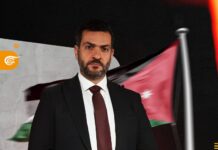An escalating number of Palestinian prisoners is being held in solitary confinement in Israeli jails, reported the Palestinian Prisoners’ Center for Studies, noting that there are now 21 Palestinian prisoners being held in isolation.
On Wednesday, Palestinian prisoners from the Popular Front for the Liberation of Palestine and Islamic Jihad announced that they would be escalating their protests of isolation; they will refuse meals on Sunday and Wednesday next week and then plan for a three-day hunger strike the following week, to be followed by an open hunger strike if there is no action. This follows on a series of protests that began last week.
Several prisoners, including long-isolated Nahar Saadi, who has been in solitary confinement for three years, are on open hunger strike against isolation. Long-term solitary confinement is a form of torture, as noted by UN Special Rapporteur Juan Mendez. The end of the use of isolation was a demand of the mass hunger strike of 2012, when thousands of Palestinian prisoners refused food for one month; at the end of the strike, 19 isolated Palestinians, including prominent leaders like PFLP General Secretary Ahmad Sa’adat, were returned to general population.
The Palestinian Prisoners’ Center for Studies noted that two prisoners, Essam al-Furukh and Ramzi Obeid, both serving life sentences, were newly transferred to isolation in Eshel prison. Nahar Saadi has been in isolation since May 2013, soon followed by Hussam Omar and Musa Soufan, both isolated in Megiddo prison since August 2013.
Noureddine Amer, Abdul Rahman Osman, Issam Zeineddine, Faris al-Soueid, Shukri Khawaja, and Abdel-Azim Abdulhaq have all been isolated for over two years as well.
Last Friday, Mohammed Ahmad ‘Adi, 58, of Beit Ummar near al-Khalil, was put in solitary confinement after he delivered a Friday sermon at prayer inside Ofer prison. He was threatened with transfer to isolation in Megiddo prison and ordered to solitary confinement for three months for giving the sermon that the occupation officials described as “inciting”. Imprisoned since 22 February 2016, he suffers from cancer and heart disease, and was scheduled before his arrest for open heart surgery and surgery for tumors of the colon at Al-Ahli hospital in Al-Khalil.
The center and his family emphasized the urgency of his case, given his health situation.
Discover more from Samidoun: Palestinian Prisoner Solidarity Network
Subscribe to get the latest posts sent to your email.





